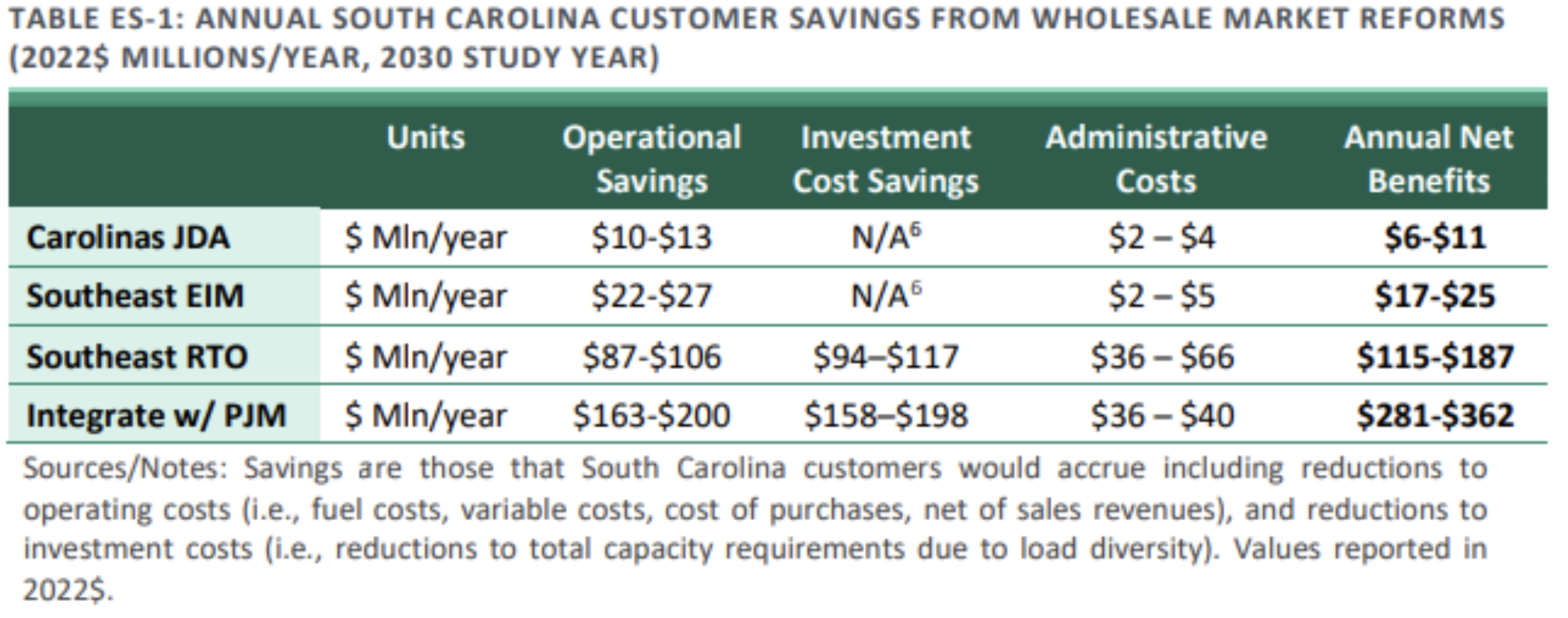SC Legislative Committee Receives Recommendations to Reduce Electricity Costs
COLUMBIA, S.C.—Following a nine-billion-dollar electric utility nuclear cost overrun debacle, the Electricity Market Reform Study Committee at the General Assembly reviewed a finalized report on options to improve South Carolina’s energy sector. The General Assembly paid Brattle Group—an expert consulting firm—$750,000 to work with multiple stakeholders to develop the report.
The major benefits of recommendations in the report include lower consumer costs, greater access to renewable energy sources, improved grid reliability and resilience, and a more competitive market that will drive innovation and improve service.
The report provides a menu of options for the legislature to consider. Some options, such as joining a regional transmission organization (RTO), require increased coordination with neighboring states (see chart below). For instance, the report finds that South Carolina could achieve $362 million in annual customer savings if North Carolina and South Carolina utilities were to join an RTO named PJM (formerly comprised of Pennsylvania, New Jersey, and Maryland).
Other options can be enacted by the General Assembly without coordination from other states. For instance, Brattle recommended that requiring increased competition when procuring new energy resources like power plants is something the General Assembly can act on now. They contend it would build upon similar legislative efforts like the 2019 Energy Freedom Act. Similarly, authorizing bonds to reduce the cost of retiring coal-fired power plants has been part of conversations at the State House, including a bill from the last legislative session.
Conservation Voters of South Carolina (CVSC) and the Coastal Conservation League (CCL) commend the General Assembly for their leadership in pursuing this study and seeking a better system that serves the interest of South Carolina ratepayers and the state’s economic development aspirations. This report demonstrates South Carolina’s leadership among Southeastern states in pursuing reform of our electrical system.
“This is a gold-standard study using actual data from South Carolina utility operators to estimate the cost savings that could come from more efficient operations,” said Eddy Moore, Senior Energy Program Director at the Coastal Conservation League. “I hope legislators fully consider these expert recommendations in order to reduce electric system costs and bolster reliability in the state.”
John Tynan, Executive Director of Conservation Voters of South Carolina, explained, “Moving to a more competitive energy market is the next logical step in a series of free-market oriented reforms enacted by the General Assembly in the wake of the 2017 Nuclear Debacle, and is the right move for ratepayers and our environment. Ratepayers and legislators recognize that our monopoly utility system, as currently structured, doesn’t serve the best interest of the state, and this report comprehensively outlines a menu of options that can chart a better way forward.”
“The findings from the SC report demonstrate significant opportunities for North and South Carolina to collaborate to lower energy costs and increase opportunities for clean energy in the Carolinas,” explains Dan Crawford, Director of Governmental Relations, North Carolina League of Conservation Voters.
“The results of this deep-dive analysis by objective, reputable experts is clear: an energy market would be better for South Carolinians than the centuries-old status quo,” said Maggie Shober, Research Director at the Southern Alliance for Clean Energy. “Incumbent utilities will try to spin this report with misinformation, but the report is indisputable that a market would lead to significant savings on electric bills.”
“If adopted, the findings from this report could make South Carolina a regional leader in energy reform and serve as an example for other Southern states looking to reduce costs for customers and improve reliability,” said Kate Mixson, Senior Attorney at the Southern Environmental Law Center. “We encourage South Carolina legislators to take these recommendations seriously.”
CVSC, CCL, and SACE will continue monitoring this process and advocating for policies prioritizing energy solutions and environmental responsibility.
###
Conservation Voters of South Carolina is a statewide nonprofit that fights for our air, land, water, and energy through bipartisan and pragmatic political action, making conservation and environmental issues a top priority among South Carolina’s elected leaders, political candidates, and voters. Learn more at cvsc.org.
The Coastal Conservation League has worked with communities, businesses, and citizen groups since 1989 to protect what we love about South Carolina, The Coastal Conservation League is a 501(c)3 charitable organization. Learn more at coastalconservationleague.org.
Since 1985, Southern Alliance for Clean Energy has worked to promote responsible and equitable energy choices to ensure clean, safe, and healthy communities throughout the Southeast. Learn more at cleanenergy.org.
*reference chart:
